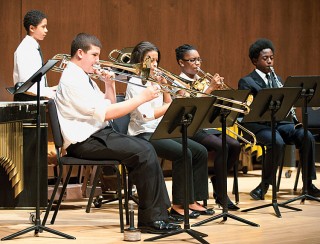Title

Students in the Juilliard Music Advancement Program perform on a regular basis. Pictured: the MAP Winter Ensemble and Orchestra concert, December 2011.
(Photo by Nan Melville)Juilliard’s instrumental music program for underserved youth has been given a new lease on life. In February, President Joseph W. Polisi announced a record $5 million gift that will all but assure the future of the 22-year-old Music Advancement Program (MAP).
Body
The gift, given by Michael Moritz and Harriet Heyman, provides the bulk of the $7 million needed to complete the program’s endowment. The couple’s “extraordinary generosity,” Polisi said, “allows a very important Juilliard program to live into the future.”
Through MAP, whose creation Polisi spearheaded in 1991, 65 children in third through eighth grade take weekly classes at Juilliard throughout the school year. The program was developed to make up for massive cuts in arts education budgets in the public schools, with the idea of particularly reaching out to students whose communities are traditionally underrepresented in the world of classical music.
Classes are offered in 16 instruments and students must have several years of playing experience to apply. Tuition is required but it’s offered on a sliding scale—and extensive financial aid is available—in order to achieve the goal of making the arts available to all. Participants are taught by current Juilliard students and alumni and other music professionals.
At a 2004 reunion of the first MAP class, several participants spoke about its impact on their lives 13 years later. Shawn Coleman, a clarinetist who had gone on to earn a bachelor’s from Juilliard, wrote in The Journal, “what was instilled in all of us is the importance of music in a person’s life” and added that MAP “embodies the very best of Juilliard: high standards in a nurturing environment.” He noted that the educational pedigrees of the group “were stellar (Columbia, Eastman, Barnard, and of course, Juilliard) [and] the employment equally impressive (J. P. Morgan, Virginia Commonwealth University, Sony Music, Wyoming Symphony, Jazz at Lincoln Center).”
On the occasion of Moritz and Heyman’s gift, Polisi said that “MAP has always represented our belief that the exceptional power of music can positively motivate children in all that they approach.” The couple, who had both benefited from scholarship aid in their own lives, made the gift in honor of Harriet’s father, Carl K. Heyman, a product of Chicago’s public schools and a music aficionado. Heyman, a former New York Times editor, wrote Private Acts: The Acrobat Sublime, a series of essays and photos that’s in part based on her own experience with acrobatic training. Moritz, a former Time bureau chief who wrote a book about Chrysler and co-wrote one on Apple, joined the venture capital firm Sequoia Capital in 1986 and became its chairman last year.
MAP’s future had been shaky in the wake of the 2009 recession. At that time, a group of funders including Moritz and Heyman provided interim funding. This latest gift assures its perpetuity.




